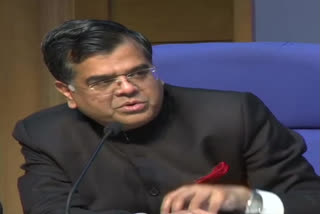New Delhi: India’s healthcare requirements are not only about Covid-19 global pandemic as the real thrust of the budget lies in tackling the long-term healthcare challenges caused by the waterborne diseases like malaria, dengue, diarrhoea, typhoid and cholera, said a top official in the ministry of finance.
Expenditure Secretary TV Somanathan, who was responsible for allocating the resources to different schemes and programmes for Rs 34.83 lakh crore Union budget, says healthcare allocation for the next year is more about tackling long term challenges rather than tackling Covid-19, which could be a one-year event.
“In the long-run, our healthcare requirements are not only about Covid. It is more in terms of malaria and dengue, which are due to the presence of stagnant wastewater,” TV Somanthan told ETV Bharat in an exclusive interaction.
In the budget speech, finance minister Nirmala Sitharaman announced the launch of PM Atma Nirbhar Swasth Bharat Yojana with an allocation of over Rs 64,000 crore in the next six years to strengthen the three-tier healthcare system in the country.
However, nearly five times more money has been allocated to ensure the supply of clean water to 2.86 crore households in 4,378 local bodies under the Jal Jeevan Mission (Urban) and for liquid waste management in 500 cities. Finance minister Nirmala Sitharaman announced an outlay of Rs 2.87 lakh crore over the five years.
“There are diseases like typhoid, cholera, diarrhoea which are due to unclean water which is why we have given special thrust on preventive health,” said the top officer.
Somanathan says in the next year's budget, a lot of money is going into water and sanitation, which is being described by the WHO as a very important healthcare requirement.
In her budget speech, Nirmala Sitharaman also talked about the WHO’s emphasis on clean water, sanitation and clean environment as a prerequisite to achieving universal health.
In order to achieve this goal, the finance minister allocated Rs 1.42 lakh crore to improve waste management in urban India over the next five years.
The money will be spent on faecal sludge management, wastewater treatment, source segregation of garbage, reduction in single-use plastic, reduction in air pollution by effectively managing waste from construction-and-demolition activities and bio-remediation of all legacy dump sites.
READ: Sitharaman tears into Congress camp, flays RaGa over 'fake narratives'
Waterborne disease burden
